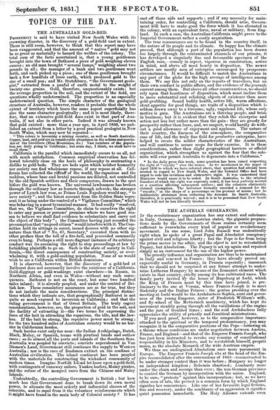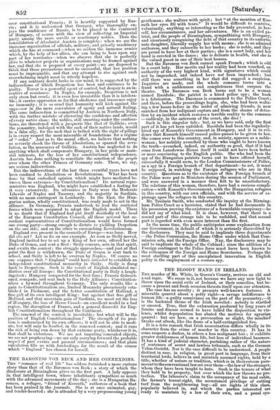THE AUSTRIAN ORDINANCES.
IF the revolutionary organization has any extent and substance in Italy, Germany, and the Austrian states, the gigantic prepara- tions made by the Governments of those realms certainly seem sufficient to overwhelm every kind of popular or revolutionary movement. In one sense, Lord John Russell was undoubtedly right when he spoke of a great Papal and Absolutist conspiracy against civil and religious liberty ; but the Pope is far from being the prime mover in the affair, and the Wed is not to reeeetablish Papacy, but Absolutism. The Papacy is set up again and repaired simply as an instrument for the use of the higher power.
The priestly influence and organization are thus to be maintained
in Italy and renewed in France : they have already proved un- expectedly useful in Germany, in Prussia especially ; insomuch that we should not be surprised at any future attempt to under- mine Lutheran Hungary by means of the Romanist element which exists in that country, chiefly among its less cultivated races. The family party invited 11y, the house of Hapsburg at Ischl, which the King of Prussia must by this time have joined, is pre- liminary to the one at Verona, where Francis Joseph is to meet Radetzky and the Italian Princes : the genius presiding over the meeting at Ischl would be the Archduchess Sophia, aunt and gover- ness of the young Emperor, sister of Frederick William's wife, and fly-wheel of the Metternich machinery, which has kept its movement steadily going through all the vacillations of the engine and the jars of troubled times ; and the said Archduchess fully appreciates the utility of priestly and Jesuitical ministrations.
If you need proof, however, as to the comparative importance
attached to the spiritual or the temporal predominancy, you may recognize it in the comparative positions of the Pope—tottering on a throne whose conditions are under negotiation between Austria, France, and England—and that of the Emperor Francis Joseph, who has just been instructed to revoke any remains of constitutional responsibility in his Ministers, and to reestablish himself, propria manu, as the absolute Monarch of the wide Austrian empire.
We thus see undisguised Absolutism once more paramount in Europe. The Emperor Francis Joseph sits at the -head of-the-Em- pire reconsolidated after the concussions of 1848—reconstructed to be. under stronger control than it was before ; Hungary no longer an independent kingdom ; Bohemia chastised; Lombardy more under the chain and scourge than ever ; the non-German provbices to control the German by incorporation with the union. England, to be sure, "protests" against this incorporation ; but, as we have often seen of late, the protest is a common form by which England signifies her concurrence. Like one of her favourite legal fictions, fine and recovery, under the semblance of an aggression it signifies quiet possession henceforth. The Holy Alliance extends even over constitutional Prussia ; it is heartily supported by Rus- sia; and it is understood that Georgey, who thoroughly en- joys the confidence of Russia, is to be placed in the command of Hungary, of course with the view of collecting an Imperial party amoiig the more servile or reactionary nobles. Thus the consolidation of Absolutist Austria is complete : when we see the immense organization of officials, military, and priestly machinery which she has at command--e-when we reckon the immense armies which, by the help of her allies, she can bring to bear upon any part of her territories—when we observe that she is perfectly alive to whatever projects or organizations may be framed against her, and that she is prepared at every point—we are disposed to think that those precautions must be successful, that her position must be impregnable, and that any attempt to rise against such overwhelming might must be utterly hopeless. If any contrary doubt lurks in our mind, it is suggested by the indiscretions of which Despotism has been and continues to be guilty. Terror is a powerful agent of control, but despair is an in- centive of resistance. In Naples, for example, Despotism is not only stern but cruel ; it is even less irresistible than it is intolera- ble; it carries oppression so far,that obedience and innocence enjoy no immunity; it is so cruel that humanity will kick against the oppressor in the mere convulsion of agony and natural feeling. The same indiscretion is committed by Austria in Northern Italy, with the further mistake of alienating the confidence and affection of every native class: the nobles, still smarting under the confisca- tions, are threatened with a jacquerie like that of Galicia; even the peasantry, indulged with the sack of their native lands, would be a false ally, for the mob that is bribed with the right of pillage is in every respect the most miserable of foundations for a regime of "order." And as to the moral effect, we believe that nothing so severely shook the throne of Absolutism, so spurred the revo- lution, as the massacres of Galicia. Austria has neglected to do anything which shall compensate Hungary, in her pride or mate- rial interests, for the loss of her constitutional independence. Austria has done nothing to conciliate the sanction of the people over whom the other Princes of Germany rule. These, we say, are serious indiscretions.
But the indiscretions of the last three eventful years have not been confined to Absolutism or Revolutionism. What has been done by that embodied opinion which might have mediated be- tween those extremes—by Constitutionalism ? Its natural repre- sentative was England, who might have established a footing for it very extensively. Its advocates in Italy were the Moderate Liberals of Naples and Tuscany, and the majority in Sardinia, with no mean contingent in Lombardy. In the East, the Hun- garian nation, wholly constitutional, was ready made to act in the alliance. In Germany, Prussia undertook to lead the scattered forces which were prepared to adopt the English model. There is no doubt that if England had put itself decidedly at the head of the European Constitution Council, all these severed but ac- cordant representatives of Constitutionalism would have formed one strong party—strong enough to dictate to yielding Despotism on the one side, and on the other to encroaching Revolutionism.
England was present in the councils of Europe—was busy. How did she act? Let us fix on one example. As soon as Sicily moved, England incited her to set up a King of her own, offered her the Duke of Genoa, and sent a fleet : Sicily concurs, acts in that spirit, and awaits the contest: the struggle approaches,—and just at that point the fleet is withdrawn, the Duke of Genoa is sent back to school, and Sicily is left to be overrun by Naples. Of course no one supposes that "England" could have intended to establish an independent constitutional monarchy in Sicily. Sicily is flung back to Despotism. Such is the result of English simulated me- diation over all Europe : the Constitutional party in Italy a laugh- ingstock; Hungary conquered for the first time ; Prussia disheart- ened, renegade, and sent back to the Holy Alliance ; Constitution- alism a byword throughout Germany. The only results like a gain to Constitutionalism are, limited Monarchy precariously esta- blished in Piedmont, and the better constitution of Holland, a free gift of its own intelligent King : but against that free gift of Holland, and that uncertain gain of Sardinia, we must set the loss of Hungary, the loss of Hesse Cassel—an excellent model in a bad region, the disruption of France, and a general discredit for Eng- lish Constitutionalism throughout the Continent. The renewal of the contest is inevitable ; but what will be the position of English Constitutionalism ? The strength of its posi- tion is undermined by its own officers; it will not be able to medi- ate, but will only be hustled, in the renewed contest; and it runs the risk of being run down by that extreme party, whichever it is, that shall be victorious. We are not imputing concealed objects, we are not prophesying—we are only carrying forward the probable sequel of past events and present circumstances ; and that plain calculation fills us with forebodings for the result of the course which " England " has chosen for herself.



























 Previous page
Previous page